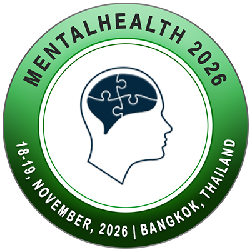Track: Obesity and Eating Disorder

“Understanding and Addressing Obesity and Eating Disorders: Comprehensive Approaches to Treatment and Prevention”
This session will examine the relationship between obesity and eating disorders, focusing on their psychological and physical aspects. Attendees will learn about different types of eating disorders, such as anorexia nervosa, bulimia nervosa, and binge-eating disorder, and their impact on overall health. The session will cover the psychological factors contributing to disordered eating, including body image issues, emotional regulation, and stress. Participants will explore the links between obesity and eating disorders, including the role of metabolic and behavioral factors. Strategies for treatment and prevention will be discussed, emphasizing a holistic approach to managing both obesity and eating disorders.
Neurobiology of Addiction
This session will explore the neurobiological mechanisms underlying addiction, focusing on how drugs and addictive behaviors alter brain chemistry and neural pathways. Participants will gain insights into the role of neurotransmitters, reward circuits, and brain plasticity in the development and persistence of addiction. The session will emphasize how these insights can inform treatment strategies for addiction.
Behavioral Addictions: Beyond Substance Abuse
This session will discuss behavioral addictions, including gambling, internet gaming, and shopping addiction. These conditions do not involve substance use but share many features with substance use disorders. Attendees will learn about the diagnostic criteria, psychological mechanisms, and treatment approaches for managing these increasingly recognized forms of addiction.
Co-Occurring Disorders: Treating Addiction and Mental Health
This session will focus on the complex relationship between addiction and co-occurring mental health disorders, such as depression, anxiety, and PTSD. Participants will explore the challenges of diagnosing and treating individuals with dual diagnoses and discuss integrated treatment approaches that address both substance use and mental health symptoms.
The Impact of Addiction on Families and Relationships
This session will examine the profound effects addiction has on families and relationships. Topics will include codependency dynamics, the challenges faced by children of individuals with addiction, and strategies for family-based interventions to support recovery and rebuild healthy relationships.
Innovations in Addiction Treatment: Pharmacotherapy and Beyond
This session will cover the latest innovations in addiction treatment, including pharmacotherapy options such as methadone, buprenorphine, and naltrexone. Attendees will also explore non-pharmacological approaches, including cognitive-behavioral therapy (CBT), motivational interviewing, and the use of technology in addiction treatment, such as telemedicine and mobile health apps.
Prevention Strategies: Reducing the Risk of Addiction
This session will focus on evidence-based prevention strategies aimed at reducing addiction risk in various populations. Topics will include public health initiatives, community-based programs, and educational efforts targeting vulnerable groups, such as adolescents and individuals with a family history of addiction.
Addiction Recovery: Approaches to Long-Term Sobriety
This session will explore different approaches to supporting long-term recovery from addiction, including 12-step programs, peer support groups, and holistic approaches such as mindfulness and yoga. Participants will learn about factors that contribute to sustained recovery and the challenges individuals face in maintaining sobriety over time.
Scientific Highlights
- Mental Health
- Women’s Mental Health
- Psychology and Psychiatry
- Autism
- Stress, Anxiety and Depression
- Psychotherapy and Counseling Psychology
- Behavioral Health and Bullying
- Suicide and Self Harm
- Bipolar Disorder
- Schizophrenia
- Neurology and Neurological Disorder
- Addiction
- Obesity and Eating Disorder
- Child and Adolescent Psychiatry
- Obsessive Compulsive disorder
- Post-Traumatic Stress Disorder
- Personality Disorder
- Child Abuse
- Legal and Ethical Issues in Clinical Research


